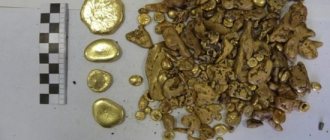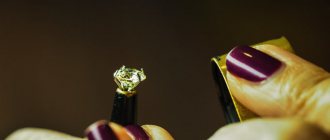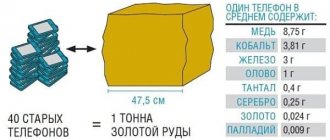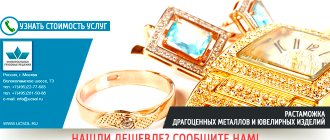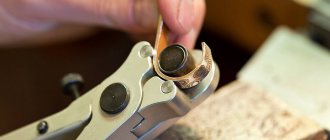Legal advice > Administrative law > What is illegal trafficking of precious metals, and what is the deadline?
It is difficult to find a person indifferent to jewelry. But gold, silver and precious stones not only attract the eye, but also have great value. This arouses interest in them not only among lovers of beauty, but also among criminals. Not all jewelry purchases take place in jewelry stores or workshops; sometimes people buy jewelry secondhand from friends. How can you avoid getting into trouble with the law in this case?
Features of the crime
Any transaction with jewelry that is not supported by documents is illegal.
By law, any operation with precious metals and stones, during which the jewelry changes ownership, must be documented with appropriate documents. This applies to the purchase, sale, gift, storage and transport of jewelry.
In everyday life, such conditions are often not met - grandmother’s jewelry can be passed on to her grandchildren without any documents. But, since these documents were not there initially, the law turns a blind eye to such situations. But it’s worth keeping receipts from the jewelry store to confirm who the owner is.
The circulation of native metals and precious stones is controlled much more strictly. Only licensed organizations can mine them and carry out any operations, and only on the condition that the state does not need these jewelry. For example, buying a silver ring in a store is a legal transaction if the seller issued a receipt, but illegal if there was no receipt. The purchase of a mineral containing silver will only become legal with the express permission of the state.
Simply put, individuals can freely buy products made of precious metals and stones, as well as products that contain precious metals (measuring instruments, radio components and others). It does not matter whether the product is in good working order. But unprocessed metal or stone, including those separated from the product (soldered-out elements of radio components, fragments of jewelry), cannot be in the hands of a private person - this violates the law.
Why is this happening? In the economy of each state there is the concept of a gold reserve, i.e. the quantities of precious metals and stones owned by the state that provide the value of the country's money. Illegal trafficking in precious metals removes them from the sphere of state supervision, especially when it comes to export abroad. Therefore, the long-term consequences of such operations are currency depreciation and economic disruption.
Responsibility for illegal trafficking
- Dgarmetalov. Depends on the value of the jewelry that became the object of the crime. The maximum punishment provided for by the Criminal Code is 5 years of compulsory labor or imprisonment for individuals, and up to seven years with a fine of up to a million rubles for a group of persons (two people are also considered a group).
- Stones. Responsibility for the turnover of stones is provided to the same extent. The likelihood of receiving the maximum sentence depends on the value of the stones with which the illegal operation was carried out.
- Pearls. Pearls are listed separately among precious stones, but responsibility for their turnover is the same as for other stones and metals. If pearls are not part of jewelry or a household product, they are the subject of a crime.
Art. 191 of the Criminal Code of the Russian Federation with comments
The encroachment is directly aimed at public relations arising in the sphere of state regulation of the circulation of precious metals, pearls, and precious stones (natural). Accordingly, these products are the subject of a crime.
As established by Federal Law No. 41, precious metals, regardless of condition and type, include:
- platinum;
- gold;
- silver;
- ruthenium, palladium, osmium, rhodium, iridium.
Natural precious stones are treated and untreated:
- diamonds;
- emeralds;
- sapphires;
- alexandrites;
- rubies.
They also include amber formations, equated to precious stones, according to the rules determined by the Government.
Saltwater and freshwater pearls, measured in carats, are also considered the subject of a crime under Article 191.
Legislation and statistics
A special license is required for the manufacture and sale of jewelry made from precious metals.
The legislation provides for several ways of trading jewelry, depending on their condition and method of use. Native precious stones and metals are mined by special organizations that have a state license.
Part of what is mined is supplied to the state’s gold reserves, and only after this the mining organization can sell the products of its labor. She can sell them only to other organizations - factories for the production of various devices and jewelry, but not to individuals.
Jewelry made from precious stones and metals is manufactured and sold by licensed organizations. The buyer can be an individual or a company. Individuals can also donate and leave jewelry for storage. An important condition for the legality of the transaction is the presence of a check and documents confirming the transfer of property. The same applies to scrap jewelry - jewelry that has become unusable and requires repair.
Devices and household items containing precious metals and stones are freely sold and can be the property of a private individual or organization. The serviceability or malfunction of the device does not matter. A check is also important here, but control over such transactions is less strict.
All other operations are considered illegal and are prosecuted by law enforcement agencies. According to statistics for 2022, crimes related to jewelry trafficking accounted for about 0.3-0.5% of the total number of economic crimes in our country. However, this ratio has not changed since 2003. This is explained by the relatively stable situation in the country - if you look at the statistics from the early to mid-90s, the numbers will be much higher.
In addition, it is quite difficult to commit a crime in this area, especially in the area that concerns the mining and jewelry business. This is a fairly narrow sector of the economy in which reputation is of great importance, and attackers are forced to enter into large conspiracies or abandon criminal activities. A much more common crime is the theft of jewelry and its sale to pawn shops or through private jewelry workshops.
Composition of the crime and types
The corpus delicti is a combination of factors that make it possible to determine an act as illegal and subject to punishment by law enforcement agencies. To do this, the following elements must be present:
- The subject of the crime, in this case, is a stone, metal or product. An illegal act is being committed against them;
- The object of the crime is a transaction or operation that is not legal, i.e. actual illegal action;
- Subjects, i.e. people who commit crimes.
The subject of the crime was discussed above.
For a transaction to be considered the object of a crime, there are several possible reasons:
- Lack of documents;
- Incorrect documentation;
- At least one of the parties to the transaction does not have the right to participate in it;
- The transaction involves an official who exceeds his authority;
- The items of the transaction themselves ended up in the hands of the current owner through illegal means (i.e., they were stolen or purchased illegally).
Citizens who are considered subjects of a crime must enter the age of criminal responsibility for especially serious crimes, i.e. 16 years. Both Russian citizens and foreigners and stateless people are subject to trial.
Types of crimes involving jewelry include illegal transactions, storage and transfer in violation of established rules.
Difficulties in qualifying illegal trafficking
The qualification of a crime has its own difficulties.
Like any other area, the circulation of precious stones has its own difficulties. As for jewelry, it is often stored at home without receipts and other documents, i.e. Formally, their storage is illegal. They are also often inherited within the family or given without paperwork.
All such cases are formally illegal transactions and illegal storage. In fact, they are carried out voluntarily, and no one’s interests are infringed upon, i.e. there are no grounds to initiate a criminal case.
The same applies to instruments and radio components. Gold and platinum are used to make some of their elements. The content of precious metals is extremely small, and not all radio amateurs have an idea of which part is made of platinum. The use of such devices is legal, as is their repair. However, if a radio amateur solders gold-containing parts, he already becomes a criminal. But the difficulty is that in order to bear criminal liability, he must be aware of the gold or platinum content, and it is almost impossible to prove this fact.
As for nuggets, a simple layman who has no geological knowledge can easily mistake a nugget for a stone that has no value, keep it or give it as a gift. Formally, these actions are illegal - they are storage and operations with native stones and metals, which cannot be performed by a private person. Therefore, lovers of rare and beautiful minerals expose themselves to serious risk.
Even jewelers who store substandard metal in their workshops, i.e. not suitable for use for decoration, they do so illegally. You can avoid liability by making a simple piece of jewelry out of it, for example, a ring or bracelet with an ornament - then it will be a piece of jewelry, the storage of which is not prohibited.
Provisions of Federal Law 41
When determining the illegality of a transaction to impute liability under Article 191, it is necessary to proceed from the fact that the rules for performing actions with the objects specified in the disposition of the rule are established by law. Therefore, the subject must comply with the stipulated rules.
In accordance with the provisions of Article 2 of Federal Law No. 41 (clauses 3, 4), subsoil areas containing precious metals and natural stones can be allocated for use solely on the basis of licenses for the extraction of these items, issued in the manner prescribed by law. In turn, the owners of these values become (with some restrictions) the entities that extracted them from the subsoil, if the extraction was carried out legally. The legal owner of precious metals and natural stones obtained from the subsoil by illegal means is the Russian Federation.
Based on these requirements, we can conclude that an entity that has illegally obtained the items specified in the disposition of Article 191, and, accordingly, has not become their owner, cannot perform actions related to the creation, change, or termination of rights to these values. Consequently, by giving them as a gift, giving them as repayment, etc., a person will make a transaction with these items that is contrary to the rules enshrined in the law.
How is the investigation into illegal trafficking of precious metals going?
The investigation begins with the fact of contacting law enforcement agencies. This is done by a witness or victim of the actions of attackers. If no one’s interests have been infringed or no one knows about the transaction or storage, then there are no grounds for initiating a criminal case, and the investigation will not begin.
The second thing that is necessary for the investigation is the subject of the crime, i.e. precious stones or metals. If a deal was made, then they must be somewhere, and discovering their whereabouts is a key point in the investigation. When the subject of a crime is discovered, it is removed from the storage location in compliance with the appropriate procedures. Then the materials are sent for examination, and only after receiving its results can the investigative authorities demand documents about the transaction.
The last stage is determining the authenticity and legality of the documents themselves. If they do not comply with the rules established by law, then the transaction is considered illegal, and its participants are considered criminals.
At any of these stages, the case may be closed due to the inability to move to the next stage of the investigation:
- At the application stage - if no one contacted the investigative authorities or the applicant refused the application;
- At the stage of searching for jewelry - if they were not found or were seized without paperwork;
- At the examination stage - if the materials were recognized as not subject to special accounting, namely: They are not jewelry;
- Not suitable for jewelry processing;
- Artificially grown;
In any case, the wording would be to close the case for lack of corpus delicti.
Punishment
The punishment depends on the severity of the crime.
The article of the Criminal Code, which establishes liability for illegal transactions with precious metals, provides for the following types of punishment:
- Mandatory work;
- Prison term;
- Fine.
Compulsory work is assigned for a period of up to 5 years, there is no lower limit. The duration depends on the damage caused to the state's economy. Assigned to both individuals and members of an organized group.
The prison term lasts up to 5 years for single criminals and up to 7 years for group members. It also depends on the severity of the crime. There is no lower limit. Appointed as an alternative to compulsory work.
The fine is the income of the convicted person for 3 years (maximum - 500,000 rubles), if he committed the crime alone, or income for 5 years (maximum - 1 million rubles) for group members. No lower limit has been established. It may be in addition to a prison sentence or compulsory labor, an alternative to other types of punishment, or not assigned at all.
The article indicates that a transaction worth more than 1.5 million rubles is considered to be a particularly large transaction. The penalty indicated as the maximum is awarded in such cases. If the damage to the state was not so catastrophic, the judge has the right to impose a more lenient punishment. Including a suspended sentence.
Judicial practice under Article 191 of the Criminal Code of the Russian Federation
A selection of judicial practice with comments from experts is presented on the website of the electronic legal system “Consultant Plus”. Also, examples of court decisions, sentences and appeals can be found on numerous forums devoted to this issue.
Citizen of the Russian Federation V.A. Petrov committed an act qualified as illegal, deliberate trafficking in precious metals in the form of gold. Acting deliberately, for selfish reasons, over the course of 7 months, he repeatedly acquired pieces of 50-100 grams of schlich gold from unidentified persons. In the future, he planned to resell the entire lot. The total weight of the gold he illegally purchased was 2047.31 grams, the cost was estimated at 4 million rubles. Storage was carried out in the personal living space of the accused at the address N st. Nskaya 1, apt. 1.
During the pre-trial investigation it was established:
- the accused had direct intent to commit a crime and realized that the gold he bought was obtained through criminal means;
- the value of the valuables that Petrov kept was assessed as large.
The accused admitted his guilt during the investigation. The court had no doubt about the defendant's guilt.
When imposing the punishment, the court took into account the presence of mitigating circumstances. Namely, full admission of guilt, active repentance, the presence of a dependent minor child, as well as the fact that the accused first came to the attention of law enforcement agencies. No aggravating circumstances were found that could aggravate the guilt.
The imposed punishment was 1 (one) year 7 (seven) months of forced labor. The time that Petrov spent in custody before the trial (3 months) is counted towards the period of forced labor.
Physical evidence (gold) is subject to transfer to the state fund after the verdict enters into legal force.
